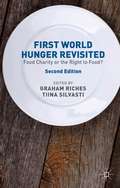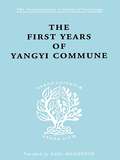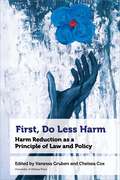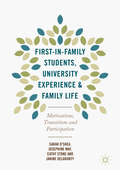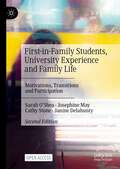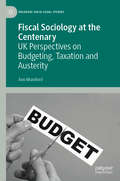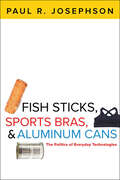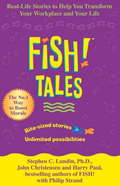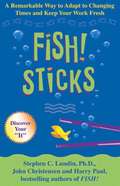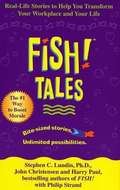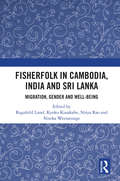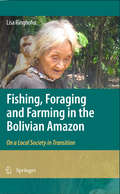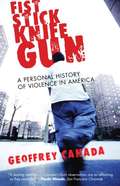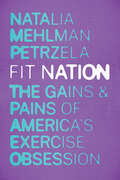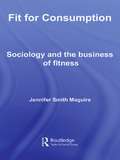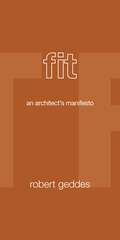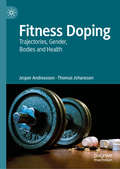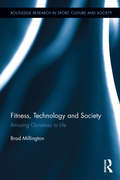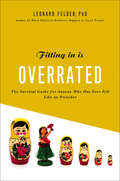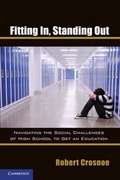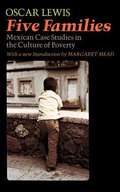- Table View
- List View
First World Hunger Revisited
by Graham Riches Tiina SilvastiIs food aid the way of the future? What are the prospects for integrated public policies informed by the right to food? First World Hunger Revisited investigates the rise of food charity and corporately sponsored food banks as effective and sustainable responses to increasing hunger and food poverty in twelve rich 'food-secure' societies.
First Years Yangyi Com Ils 109 (International Library of Sociology)
by David Crook Isabel CrookFirst Published in 1998. Routledge is an imprint of Taylor & Francis, an informa company.
First, Do Less Harm: Harm Reduction as a Principle of Law and Policy (Health and Society)
by Vanessa Gruben Chelsea CoxReaders will be able to gain a deeper understanding of how different approaches to harm reduction can create a stronger foundation for more effective policies and legislation. Scholars from law and social sciences collaborate with frontline organizations as well as with individuals with lived experience to reflect diverse perspectives, and transform how society addresses substance-related challenges.Each chapter provides unique findings, drawing from examples of harm reduction strategies implemented for opioids, cannabis, and tobacco in Canada and beyond. While harm reduction has been a central aspect of the legal and policy responses to all three substances, its application has varied significantly. First, Do Less Harm explores how the ongoing opioid crisis emphasizes the pressing need for safe consumption sites and life-saving tools like naloxone. Case studies on Canada’s legalization of cannabis highlight both the benefits and challenges of providing legal and regulated access to a drug. The volume further examines the evolving landscape of tobacco regulations where recent innovations such as vaping offer less harmful alternatives, yet raise significant concerns about youth uptake and public health. Designed for policymakers, health professionals, academics, and anyone interested in creating safer communities, this collection not only presents thought-provoking ideas but also provides inspiration to take action.
First-in-Family Students, University Experience and Family Life
by Sarah O'Shea Josephine May Cathy Stone Janine DelahuntyThis book examines the university experiences of first-in-family university students, and how these students' decisions to return to education impact upon their family members and significant others. While it is well known that parental educational background has a substantial impact on the educational levels of family and dependents, it is unclear how attending university as a first-in-family student translates into the family and community of the learner. With the continuing requirements for higher education institutions to increase the participation of students from a range of diverse backgrounds and educational biographies, this is a major gap in understanding that needs to be addressed. Exploring how this university participation is understood at an individual, familial and community level, this book provides valuable insights into how best to support different student requirements. This book will be of great interest to students and researchers in the fields of education and sociology, as well as policy-makers in education and diversity initiatives.
First-in-Family Students, University Experience and Family Life: Motivations, Transitions and Participation
by Sarah O'Shea Josephine May Cathy Stone Janine DelahuntyThis open access book, now in its second edition, offers a comprehensive overview of the experiences of First in Family (FiF) or first-generation students in higher education. It draws upon narratives of students and their family members and spans the entire university student life cycle (pre-entry, commencement, progression and graduation) with a focus on specific cohorts including mature-aged students, parents or carers, as well as the differentiated experiences of male and female learners. With research drawn from three major research projects and including over 650 FiF students from across all Australian states and territories, as well as Europe, this wealth of perspectives provides unique insights into the lived reality of attending university in contemporary higher education settings. The book is written for a broad audience and will appeal to those working in universities, as well as family members and students who may be contemplating participating in higher education.
Fiscal Policy Issues During the Transition in Russia
by Augusto Lopez-Claros Sergei V. AlexashenkoSince 1992, the Russian Federation has moved away from a command economy and has laid the foundation of a market-based system. This paper examines some of the key fiscal policy issues that arose in 1992-96, the period following the onset of economic liberalization and reform.
Fiscal Sociology at the Centenary: UK Perspectives on Budgeting, Taxation and Austerity (Palgrave Socio-Legal Studies)
by Ann MumfordThis book discusses the socio-legal tax state and its relationship to development, inequality and the transnational. 'Fiscal Sociology' commenced in 1918 when Joseph A. Schumpeter examined the links between capitalism and taxation, arguing that fiscal pressures on governments led directly to the development of tax collection, and the burgeoning growth of capitalist economies. The identification of taxation as an important component of capitalism has continued to change the way that theoretical sociologists conceptualise tax. This book documents the history of this literature to provide a summary of the topic for scholars seeking a bridge between taxation law and contextual, historical, and anthropological analyses of the development of the state, more generally. Whilst Schumpeter’s insights have been celebrated over the past one hundred years, taxation has slipped from the agenda of many scholarly disciplines, in relation to analyses of poverty, globalisation, and equality. Fiscal Sociology at the Centenary fills this gap. The implications of this literature for taxation law in the United Kingdom, in particular, are considered.
Fish Sticks, Sports Bras, & Aluminum: The Politics of Everyday Technologies
by Paul R. JosephsonA revealing look at the history, politics, and social meanings behind everyday objects.Who would have guessed that the first sports bra was made out of two jockstraps sewn together or that it succeeded because of federal anti-discrimination laws? What do simple decisions about where to build a road or whether to buy into the carbon economy have to do with Hurricane Katrina or the Fukushima nuclear disaster? How did massive flood control projects on the Mississippi River and New Deal dams on the Columbia River lead to the ubiquity of high fructose corn syrup? And what explains the creation—and continued popularity—of the humble fish stick?In Fish Sticks, Sports Bras, and Aluminum Cans, historian Paul R. Josephson explores the surprising origins, political contexts, and social meanings of ordinary objects. Drawing on archival materials, technical journals, interviews, and field research, this engaging collection of essays reveals the forces that shape (and are shaped by) everyday objects.Ultimately, Josephson suggests that the most familiar and comfortable objects—sugar and aluminum, for example, which are inextricably tied together by their linked history of slavery and colonialism—may have the more astounding and troubling origins. Students of consumer studies and the history of technology, as well as scholars and general readers, will be captivated by Josephson’s insights into the complex relationship between society and technology.“Josephson’s conclusions are guaranteed to make you think of the modern world and its interconnectedness in a different light.” —Cosmos“Every chapter of this book offers surprising insights and is a pleasure to read.” —ICON
Fish Sticks, Sports Bras, and Aluminum Cans: The Politics of Everyday Technologies
by Paul R. JosephsonWhat do bananas, rocket ships, bicycles, and French fries have in common?Who would have guessed that the first sports bra was made out of two jockstraps sewn together or that it succeeded because of federal anti-discrimination laws? What do simple decisions about where to build a road or whether to buy into the carbon economy have to do with Hurricane Katrina or the Fukushima nuclear disaster? How did massive flood control projects on the Mississippi River and New Deal dams on the Columbia River lead to the ubiquity of high fructose corn syrup? And what explains the creation—and continued popularity—of the humble fish stick? In Fish Sticks, Sports Bras, and Aluminum Cans, historian Paul R. Josephson explores the surprising origins, political contexts, and social meanings of ordinary objects. Drawing on archival materials, technical journals, interviews, and field research, this engaging collection of essays reveals the forces that shape (and are shaped by) everyday objects. Ultimately, Josephson suggests that the most familiar and comfortable objects—sugar and aluminum, for example, which are inextricably tied together by their linked history of slavery and colonialism—may have the more astounding and troubling origins. Students of consumer studies and the history of technology, as well as scholars and general readers, will be captivated by Josephson’s insights into the complex relationship between society and technology.
Fish Tales: Real Stories To Help Transform Your Workplace And Your Life
by Stephen C LundinFrom the authors of bestselling FISH!, exciting real-life applications of the FISH! philosophy to boost morale and quality of business in the workplace.
Fish! Sticks: A Remarkable Way to Adapt to Changing Times and Keep Your Work Fresh
by Stephen C. LundinThe 'o-FISH!-al' follow-up to the phenomenal bestselling Fish! and Fish! Tales, Fish! Sticks is a stand-alone business parable that shows you how to come up with a vision for your business and how to keep it alive, vital, and renewed through tough times, such as turnover in management and staff or a troubled economy. Using the example of a hugely successful, fictional sushi restaurant as a model for a vision of continual renewal, Fish! Sticks employs the same kind of easy-to-read story that was used in Fish! to illustrate its three major principals of continued success: Commit, Be It, and Coach It. When Stephanie, a new manager, takes over from a wildly popular and now promoted boss, she is faced with the problem of how to keep spirits up in a corporate unit that has, frankly, started to get bored and cranky and revert to its old ways. But then she visits the amazing Taka Sushi (formerly Taka Teriyaki), with its lines of customers cheerfully waiting for hours to get in. Soon, she realizes that the way to keep her employees motivated and her customers delighted can be learned from a bunch of waiters who teach one another everything they need to know. And when she finds out just how the owner of Taka knew to switch her main bill of fare from teriyaki to sushi long before anyone else, what she really discovers is the secret of keeping your work fresh.
Fish! Tales: Real-Life Stories to Help You Transform Your Workplace and Your Life
by Stephen C. Lundin Harry Paul John Christensen Philip StrandFISH! told the story of a fictional company which transformed itself by applying lessons learned from Seattle's famous Pike Place Fish market. Now, with FISH! TALES, readers can learn how real-life businesses and individuals energized their workplaces and their lives by implementing the lessons from FISH! Best of all, the book stands on its own for newcomers to the FISH! philosophy. FISH! TALES focuses on diverse companies, such as a bustling Sprint regional customer service center, a quiet neurosurgical unit at a major hospital, and a brilliant car dealership. It features dozens of short takes quick and easy ways to apply the FISH! philosophy right now. And it includes a detailed program with specific steps and action plans.
Fisherfolk in Cambodia, India and Sri Lanka: Migration, Gender and Well-being
by Kyoko Kusakabe Nitya Rao Ragnhild Lund Nireka WeeratungeThis volume studies the coastal and riparian fishing communities of three Asian countries – Cambodia, India and Sri Lanka. It explores issues of migration and movement, gender relations, wellbeing, and nature-society relations common among these communities, and studies the impacts of internal and external pressures such as changing state policies, increased market exposure and unstable environmental situations. It also discusses the changes needed to ensure safe migration, social inclusion and the gendered well-being of fishers in these countries, and identifies the roles that social networks and collective action play in bringing about these improvements. Fisherfolk in Cambodia, India and Sri Lanka presents a rigorously investigated account of the peoples and production systems of some of Asia’s most populated and contested but dynamic and productive coasts and floodplains. The book will be of importance to students and researchers of Asian studies, development studies, geography, sociology, migration studies, gender studies, and minority studies.
Fishing, Foraging and Farming in the Bolivian Amazon
by Lisa RinghoferEmpirical in character, this book analyses the society-nature interaction of the Tsimane', a rural indigenous community in the Bolivian Amazon. Following a common methodological framework, the material and energy flow (MEFA) approach, it gives a detailed account of the biophysical exchange relations the community entertains with its natural environment: the socio-economic use of energy, materials, land and time. Equally so, the book provides a deeper insight into the local base of sociometabolic transition processes and their inherent dynamics of change. The local community described in this publication stands for the many thousands of rural systems in developing countries that, in light of an ever more globalising world, are currently steering a similar - but maybe differently-paced - development course. This book presents insightful methodological and conceptual advances in the field of sustainability science and provides a vital reader for students and researchers of human ecology, ecological anthropology, and environmental sociology. It equally contributes to improving professional development work methods.
Fist Stick Knife Gun
by Geoffrey CanadaCanada (president of the Rheedlen Centers for Children and Families in New York City) offers a gripping memoir of his own youth and adulthood, as well as a description of his vision for a better future for children growing up in a frightening world of poverty, automatic weapons, and the continual threat of violence. Annotation c. by Book News, Inc., Portland, Or.
Fit Nation: The Gains and Pains of America's Exercise Obsession
by Natalia Mehlman PetrzelaHow is it that Americans are more obsessed with exercise than ever, and yet also unhealthier? Fit Nation explains how we got here and imagines how we might create a more inclusive, stronger future. If a shared American creed still exists, it’s a belief that exercise is integral to a life well lived. A century ago, working out was the activity of a strange subculture, but today, it’s almost impossible to avoid exhortations to exercise: Walk 5K to cure cancer! Awaken your inner sex kitten at pole-dancing class! Sweat like (or even with) a celebrity in spin class! Exercise is everywhere. Yet the United States is hardly a “fit nation.” Only 20 percent of Americans work out consistently, over half of gym members don’t even use the facilities they pay for, and fewer than 30 percent of high school students get an hour of exercise a day. So how did fitness become both inescapable and inaccessible? Spanning more than a century of American history, Fit Nation answers these questions and more through original interviews, archival research, and a rich cultural narrative. As a leading political and intellectual historian and a certified fitness instructor, Natalia Mehlman Petrzela is uniquely qualified to confront the complex and far-reaching implications of how our contemporary exercise culture took shape. She explores the work of working out not just as consumers have experienced it, but as it was created by performers, physical educators, trainers, instructors, and many others. For Petrzela, fitness is a social justice issue. She argues that the fight for a more equitable exercise culture will be won only by revolutionizing fitness culture at its core, making it truly inclusive for all bodies in a way it has never been. Examining venues from the stage of the World’s Fair and Muscle Beach to fat farms, feminist health clinics, radical and evangelical college campuses, yoga retreats, gleaming health clubs, school gymnasiums, and many more, Fit Nation is a revealing history that shows fitness to be not just a matter of physical health but of what it means to be an American.
Fit Nation: The Gains and Pains of America's Exercise Obsession
by Natalia Mehlman PetrzelaHow is it that Americans are more obsessed with exercise than ever, and yet also unhealthier? Fit Nation explains how we got here and imagines how we might create a more inclusive, stronger future. If a shared American creed still exists, it’s a belief that exercise is integral to a life well lived. A century ago, working out was the activity of a strange subculture, but today, it’s almost impossible to avoid exhortations to exercise: Walk 5K to cure cancer! Awaken your inner sex kitten at pole-dancing class! Sweat like (or even with) a celebrity in spin class! Exercise is everywhere. Yet the United States is hardly a “fit nation.” Only 20 percent of Americans work out consistently, over half of gym members don’t even use the facilities they pay for, and fewer than 30 percent of high school students get an hour of exercise a day. So how did fitness become both inescapable and inaccessible? Spanning more than a century of American history, Fit Nation answers these questions and more through original interviews, archival research, and a rich cultural narrative. As a leading political and intellectual historian and a certified fitness instructor, Natalia Mehlman Petrzela is uniquely qualified to confront the complex and far-reaching implications of how our contemporary exercise culture took shape. She explores the work of working out not just as consumers have experienced it, but as it was created by performers, physical educators, trainers, instructors, and many others. For Petrzela, fitness is a social justice issue. She argues that the fight for a more equitable exercise culture will be won only by revolutionizing fitness culture at its core, making it truly inclusive for all bodies in a way it has never been. Examining venues from the stage of the World’s Fair and Muscle Beach to fat farms, feminist health clinics, radical and evangelical college campuses, yoga retreats, gleaming health clubs, school gymnasiums, and many more, Fit Nation is a revealing history that shows fitness to be not just a matter of physical health but of what it means to be an American.
Fit for Consumption: Sociology and the Business of Fitness
by Jennifer Smith MaguireThis is the first text to offer a comprehensive socio-cultural and historical analysis of the current fitness culture. Fitness today is not simply about health clubs and exercise classes, or measures of body mass index and cardiovascular endurance. Fit for Consumption conceptualizes fitness as a field within which individuals and institutions may negotiate - if not altogether reconcile - the competing and often conflicting social demands made on the individual body that characterize our current era. Intended for researchers and senior undergraduate and postgraduate students of sport, leisure, cultural studies and the body, this book utilizes the US fitness field as a case study through which to explore the place of the body in contemporary consumer culture. Combining observations in health clubs, interviews with fitness producers and consumers, and a discourse analysis of a wide variety of fitness texts, this book provides an empirically grounded examination of one of the pressing theoretical questions of our time: how individuals learn to fit into consumer culture and the service economy and how our bodies and selves become ‘fit for consumption.'
Fit: An Architect's Manifesto
by Robert GeddesWhy architecture matters—and how to make it matter moreFit is a book about architecture and society that seeks to fundamentally change how architects and the public think about the task of design. Distinguished architect and urbanist Robert Geddes argues that buildings, landscapes, and cities should be designed to fit: fit the purpose, fit the place, fit future possibilities. Fit replaces old paradigms, such as form follows function, and less is more, by recognizing that the relationship between architecture and society is a true dialogue—dynamic, complex, and, if carried out with knowledge and skill, richly rewarding.With a tip of the hat to John Dewey, Fit explores architecture as we experience it. Geddes starts with questions: Why do we design where we live and work? Why do we not just live in nature, or in chaos? Why does society care about architecture? Why does it really matter? Fit answers these questions through a fresh examination of the basic purposes and elements of architecture—beginning in nature, combining function and expression, and leaving a legacy of form.Lively, charming, and gently persuasive, the book shows brilliant examples of fit: from Thomas Jefferson's University of Virginia and Louis Kahn's Exeter Library to contemporary triumphs such as the Apple Store on New York's Fifth Avenue, Chicago's Millennium Park, and Seattle's Pike Place.Fit is a book for everyone, because we all live in constructions—buildings, landscapes, and, increasingly, cities. It provokes architects and planners, humanists and scientists, civic leaders and citizens to reconsider what is at stake in architecture—and why it delights us.
Fitness Doping: Trajectories, Gender, Bodies and Health
by Thomas Johansson Jesper AndreassonThis book compiles several years of multi-faceted qualitative research on fitness doping to provide a fresh insight into how the growing phenomenon intersects with issues of gender, body and health in contemporary society. Drawing on biographical interviews, as well as online and offline ethnography, Andreasson and Johansson analyse how, in the context of the global development of gym and fitness culture, particular doping trajectories are formulated, and users come into contact with doping. They also explore users’ internalisation of particular values, practices and communications and analyse how this influences understandings of the self, health, gender and the body, as well as tying this into wider beliefs regarding individual freedom and the law. This insight into doping goes beyond elite and organised sports, and will be of interest to students and scholars across the sociology of sport, leisure studies, and gender and body politics.
Fitness, Technology and Society: Amusing Ourselves to Life (Routledge Research in Sport, Culture and Society)
by Brad MillingtonThe fitness industry is experiencing a new boom characterized by the proliferation of interactive and customizable technology, from exercise-themed video games to smartphone apps to wearable fitness trackers. This new technology presents the possibility of boundless self-tracking, generating highly personalized data for self-assessment and for sharing among friends. While this may be beneficial – for example, in encouraging physical activity – the new fitness boom also raises important questions about the very nature of our relationship with technology. This is the first book to examine these questions through a critical scholarly lens. Addressing key themes such as consumer experience, gamification, and surveillance, Fitness, Technology and Society argues that fitness technologies – by ‘datafying’ the body and daily experience – are turning fitness into a constant pursuit. The book explores the origins of contemporary fitness technologies, considers their implications for consumers, producers, and for society in general, and reflects on what they suggest about the future of fitness experience. Casting new light on theories of technology and the body, this is fascinating reading for all those interested in physical cultural studies, technology, and the sociology of sport.
Fitting In Is Overrated: The Survival Guide for Anyone Who Has Ever Felt Like an Outsider
by Leonard FelderFrom a psychologist, “practical but insightful coping strategies . . . to build self-awareness and empowerment” around self-acceptance in social situations. (Publishers Weekly)To thine own self be true. But can you do that while still being a valued part of the wider community? Or must you always sacrifice your own inclinations and desires to fit in? For anyone who has ever felt like an outsider at work, in groups, in school, or even in your own extended family, help is on the way. Bestselling author Leonard Felder, PhD, has written the first book with advice on how to be successful personally and professionally when you think differently, live differently, create differently, or solve problems differently than those around you. This wise and perceptive guide is neither about withdrawing into isolation and passivity, nor about spending every waking hour battling with others. Rather, it’s about choosing wisely when to speak your truth and saying it in a way that gets positive results. Dr. Felder shows exactly how creative, thoughtful, unique individuals can survive and thrive in social situations. He provides actual examples from his own practice and precise techniques that will assure your good ideas, outsider perspective, and innovative solutions are respected and taken seriously. Both inspiring and practical, it offers soothing balm and useful answers for everyone who heard too often during adolescence or young adulthood that “you just don’t fit in”—and for the ones who love and counsel them, too. Even more important, it reveals how the very qualities that made you different can become your greatest strengths and most important gifts to the world.
Fitting In, Standing Out
by Robert CrosnoeIn American high schools, teenagers must navigate complex youth cultures that often prize being 'real' while punishing difference. Adults may view such social turbulence as a timeless, ultimately harmless rite of passage, but changes in American society are intensifying this rite and allowing its effects to cascade into adulthood. Integrating national statistics with interviews and observations from a single school, this book explores this phenomenon. It makes the case that recent macro-level trends, such as economic restructuring and technological change, mean that the social dynamics of high school can disrupt educational trajectories after high school; it looks at teenagers who do not fit in socially at school - including many who are obese or gay - to illustrate this phenomenon; and it crafts recommendations for parents, teachers and policy-makers about how to protect teenagers in trouble. The result is a story of adolescence that hits home with anyone who remembers high school.
Five Families: Mexican Case Studies in the Culture of Poverty
by Oscar LewisThis book is a dramatic and forceful account of the men, women, and children of five Mexican families and the impoverished communities in which they live.
Five Fast Pennies (Routledge Revivals)
by Ralph W. KetnerFirst published in 1994, Five Fast Pennies was written by the Co-Founder of Food Lion, Inc., Ralph W. Ketner, to tell the story of the challenges and opportunities he faced throughout his life and career. Accessibly written, the book provides a detailed insight into Ketner’s philosophy of "Five fast pennies instead of one slow nickel", his views on success, and his journey from childhood through to Co-Founder of Food Lion, Inc., and beyond.
